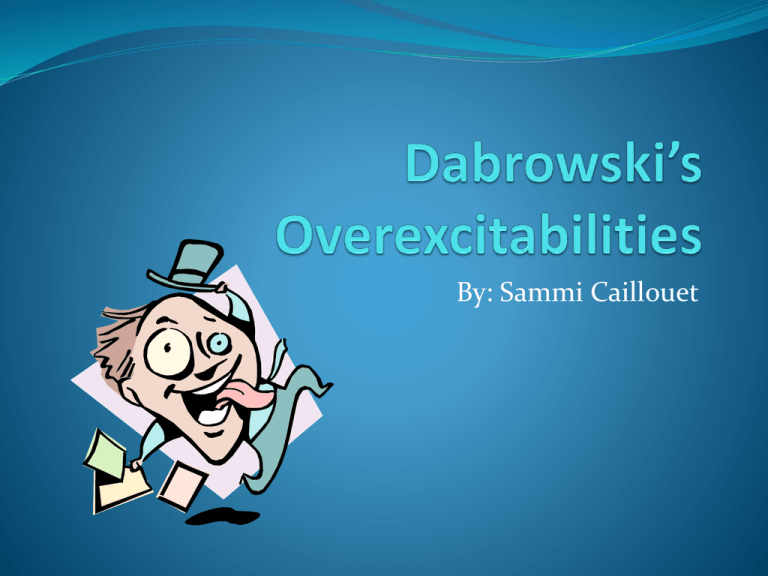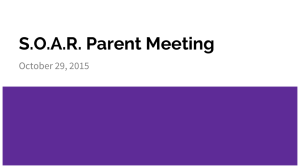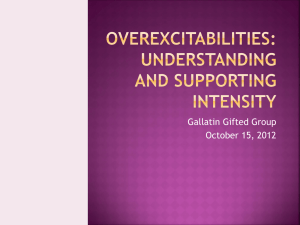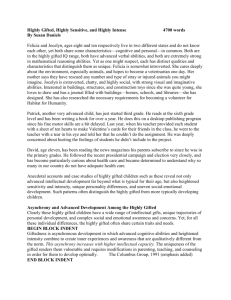Dabrowski's Over-Excitabilities
advertisement

By: Sammi Caillouet Are you over-excitable??? Dabrowski’s Concept: A Polish psychologist by the name of Kazimierz Dąbrowski came up with a concept to help understand the social and emotional development of gifted students. Dabrowski claimed that… Some people were more excitable than others and their reactions made them appear to be more intense than others He found this to be especially true in gifted individuals He concluded that these excitabilities could be categorized in 5 areas Dabrowski’s 5 Areas of Overexcitabity: Psychomotor Overexcitability Sensual Overexcitability Intellectual Overexcitability Imaginational Overexcitability Emotional Overexcitability Psychomotor Overexcitability These people tend to have a surplus of energy. They may seem as if they are unable to contain their energy and this can sometimes be misdiagnosed as ADHD. Characteristics to look for: Needs movement Compulsive talking Nervous ticks Extra energy that can sometimes be mistaken for ADHD Rapid speech and use of hand gestures May be impulsive Sleeplessness Compulsive organizing Sensual Overexcitability People who are sensually overexcitable tend to have heightened awareness of the senses. They are drawn to things that are aesthetically pleasing and may tend to overindulge . Characteristics to look for: Very sensitive to good/bad smells and loud noises Sensitivity to bright or harsh lights Deep appreciation of beauty such as a beautiful work of art, sunset, a good book, or a piece of music that brings a deep emotional response Has an aversion to the feel of some materials Craves comfort May overindulge in things like food or shopping sprees Enjoys being the center of attention Intellectual Overexcitability This is the most commonly recognized overexcitability in gifted children. These people have a need for knowledge. They are very inquisitive and want to know how and why things are the way they are. Characteristics to look for: Ability to concentrate for a long period of time on a topic of interest Constantly questioning Voracious reader Thinks theoretically and analytically Good problem solver Sometimes gets in trouble at school for challenging the teacher’s thinking Loves learning Imaginational Overexcitability These people tend to have very vivid imaginations. They think visually and tend to daydream often. They live in a fantasy world and may be thought of as “spacey”. Characteristics to look for: Good sense of humor Tend to remember dreams Very creative May have imaginary friends Believe in magic Love metaphors Thinks in pictures Fear of the unknown May imagine the worst case scenario Emotional Overexcitabiity These people are very emotionally sensitive. They feel their emotions very intensely. They tend to have higher highs and lower lows than most and they form very deep connections to others. Characteristics to look for: Anxiety A heightened sense of right and wrong and a demand for justice Need for security Form strong attachments Sensitive to the feelings of others May tend to be depressed or lonely Difficulty adjusting to new environments or situations Feelings of inadequacy or inferiority Some Helpful Tips While overexcitability can be exciting and make life more fun, they can also lead to frustration and challenges in daily life. Tips for Dealing with Overexcitability Allow time for your child to express his or her overexcitability in a safe environment. For example, make time for physical activity or daydreaming. Educate your child and others involved in your child's life on overexcitabilities. Encourage your child to focus on his or her strengths and to use his or her overexcitabilities to an advantage. —Anne N. Rinn, PhD Tips for Dealing with Overexcitability Teach your child skills to manage his or her overexcitabilities effectively. For example, teach your child emotion regulation techniques (e.g., deep breathing exercises for dealing with stress or anger) or how to effectively cope with offensive stimuli (e.g., politely declining a certain food or avoiding certain smells). Emphasize your child's differences as a positive and not a negative. Help your child to understand that being different is okay. We are all unique beings and should be celebrated as such —Anne N. Rinn, PhD If you would like further information on OE’s or other topics pertaining to gifted children please check out the websites listed below . http://www.hoagiesgifted.org/living_with_oes.htm -This website has many informative articles, book suggestions, and even advice for parenting gifted children. It is a very comprehensive website that should prove to be useful to parents of gifted children http://www.stephanietolan.com/dabrowskis.htm -This website gives specific information on Dabrowski and his concept of overexcitabilities http://www.nagc.org/ - This is the website for the National Association of Gifted Children. There are many helpful articles on a variety of topics concerning gifted children Follow-Up Now that you have been introduced to some new information about Overexcitability, you may like to see how it applies to your family Please complete the Overexcitability quiz that I have given to your child and see which of these categories best describes him/her. You may even learn a little something about yourself too! Remember that you may fit in more than one of these categories.






